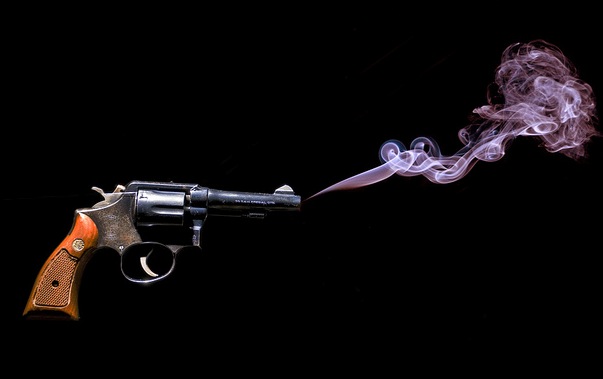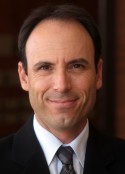
After the mass shooting of school children at Sandy Hook Elementary, it appeared that new legislation on guns might advance in Congress. Instead, in spite of some changes in states, the bitter politics of guns took over and federal legislation stalled. In advance of a Zócalo/Occidental College event, “How Do We Break the Deadlock in the Gun Debate?” we asked experts in gun policy: Why is gun policy so much more contentious in the United States than in other countries?
Adam Winkler
Because of an abrupt change in the leadership of the National Rifle Association 35 years ago

In 1977, the National Rifle Association was transformed literally overnight. The leaders of the gun group, which had long supported gun control laws, were thinking about moving the headquarters from Washington, D.C., to Colorado Springs.
The move was not merely physical. The leaders of the NRA were moderates and wanted to retreat from political activity and refocus the organization on its traditional roots in marksmanship and hunting. This angered a growing group of dissidents among the membership who thought guns weren’t about shooting ducks but about self-protection in a time of rising crime rates and urban decay.
The dissidents, led by Harlon Carter, the disgruntled former political director of the NRA’s lobbying arm, hatched a secret plan to take over the organization. At an annual meeting of the membership in Cincinnati, Carter and his team manipulated the organization’s rules of order to challenge the moderates. When the sun rose the next day, the entire leadership of the NRA had been ousted. Carter was the new leader, and the board was packed with other hardliners committed to an uncompromising, extreme version of the Second Amendment that rejected nearly any gun controls.
The new NRA cancelled the proposed move, recommitted to political activism, and became a central player in the rising tide of anti-government conservatism that eventually swept Ronald Reagan into the White House. Harlon Carter would transform the NRA into of the most powerful and feared players in Washington and in statehouses nationwide. Of course, the seeds for the NRA’s power were already there: an individualistic society in which government wasn’t trusted to solve major social problems; a cultural heritage with strong associations with guns, from the minutemen to the Wild West; constitutions, both state and federal, with longstanding protections for the right to bear arms; and a weak, diffuse gun control movement. Yet it was one night in Ohio that changed the American gun debate and made it more contentious than ever.
Adam Winkler is a professor at UCLA School of Law and the author of Gunfight: The Battle over the Right to Bear Arms in America.
Peter Squires
Because the gun rights arguments have been undermined by evidence, and are based on emotion

The U.S. ‘gun debate’ is so circular, unproductive, and inconclusive because it is largely based upon spurious arguments grounded upon two wholly incompatible types of claim. On the one hand, gun rights advocates have asserted a fundamental right, based upon the Second Amendment to the constitution, to “keep and bear arms.” This claim was once accompanied by scientific evidence that purported to show that private citizens carrying firearms could contribute to crime reduction and public safety. This at least suggested that the issue could be debated on rational terrain. However, such claims have subsequently proven to be lamentably false—high gun ownership/lax control communities have far more gun deaths; gun owners are much more likely to be killed by gunshots; children are at risk from firearms in the home; guns in the home are more likely to be used against the home’s occupants than anyone else.
Facing such overwhelming evidence, as in so many other ‘culture war’ controversies, gun lobbyists have fallen back upon their core ideological stances. The evidence no longer matters; the ‘fundamental right’ is what counts. They also overlook that, during the past 40 years, the very meaning of that ‘fundamental right’ itself has changed dramatically, again, not as the result of compelling new evidence, but merely as a result of a deluge of reinterpretation and political maneuvering in judicial appointments.
All of which leaves us with two fabricated arguments for gun ownership, neither of which stand up to historical or evidential scrutiny and both of which obscure the real issues. As the fallout from the Trayvon Martin case and other “Castle Doctrine” shootings reveal, the politics of guns are really about fear, crime, race, and social order in contemporary America.
The irrationality of the current gun lobby arguments may mark their demise. Those arguments have become more driven by emotion and ideology as the constituency for the declines, and gun ownership falls and becomes more concentrated in a smaller number of people. These gun arguments are defended mostly by a Republican rump that has congealed around a set of culturally conservative issues that have a diminishing appeal to the growing non-white voting constituencies likely to shape the future of electoral politics in America. These arguments are destined, in time, to lose.
Peter Squires is a professor of criminology and public policy at the University of Brighton, located on the English South coast. He is the author of Gun Culture or Gun Control? (Routledge, 2000). His new book, due for publication shortly, is titled Gun Crime in Global Context. Visit him at www.petersquires.net.

There is no single reason why gun policy in the United States is such a contentious and deadlocked issue. But one of the major contributing factors is that the opposing sides are simply speaking different languages. To gun rights advocates, gun ownership is a civil rights issue, a freedom on par with the freedom of speech or of religion. To proponents of gun control, guns are a public health and safety issue. Arguments based on the former carry little weight with those concerned with the latter, and vice versa.
Relatively few nations have a right to individual armament specifically enumerated in their constitutions. The United States does, which puts advocates of gun control in the awkward position of arguing against what gun rights supporters see as an inalienable and fundamental civil right. That situation is exacerbated by the dearth of accessible, nonpartisan scientific research on the effects of guns and gun control measures upon society—a result of a ban on federal funding for research that might be used to promote gun control.
A rational conversation about gun rights and gun control is entirely possible. But at the moment there is not only a lack of common ground between the two sides but also there is a lack of agreement on the basic terms of the debate. More research and more data won’t end the divisions over gun policy, but it might help turn a screaming match into an actual conversation.
Jacob Parakilas is senior weapons researcher at Action on Armed Violence. He works on issues around the arms trade, irregular warfare and small arms. His academic research has covered nuclear weapons, violent non-state actors in the Middle East, and drug violence and the arms trade in Mexico.
Wendy Cukier
Because the Constitution, our history, our culture, and the NRA have made us global outliers on guns

Why is gun control more contentious in the United States than in other countries? This is a question asked worldwide as the problems of inadequate regulation of firearms seem obvious to those outside.
The United States has by far the highest rate of gun ownership in the industrialized world, almost one gun per person. Indeed, the Geneva-based Small Arms Survey estimates that almost one third of all the guns in the world are in the hands of U.S. civilians. The U.S. also leads industrialized countries in gun deaths. For example, in 2010 the U.S. had more than 11,078 gun murders, while Canada, its closest neighbour, had 171. Adjusting for population, 2010 rates of homicide without guns are comparable (1.27 per 100,000 of in Canada versus 1.68 in the US) while the gun homicide rate per 100,000 is seven times higher in the U.S. (0.53 in Canada versus 3.42 in the U.S.) suggesting the availability of guns is a major factor.
Not only are U.S. guns a threat to the lives of Americans, but also they fuel the illegal gun trade worldwide. For example it is estimated that two-thirds of handguns seized in crime in Canada are smuggled in from the United States. Most countries in the world—even those with entrenched hunting cultures—license gun owners, register guns, and prohibit civilian ownership of firearms. Almost no industrialized countries allow widespread carrying of handguns for the purposes of self-protection. Clearly the U.S. is different.
Certainly there are constitutional, historical and cultural differences that account for this. Many argue that the American Constitution enshrines “the right to bear arms” limiting the ability of the government to regulate firearms (although the extent of these limits are not clear). Many states do have laws that are comparable to those in most developed countries. And certainly it is true that guns in the U.S. are iconic and linked to the settlement of the West.
Guns are deeply embedded in notions of masculinity and in images of classic American heroes and anti-heroes from John Wayne to Bruce Willis. And many Americans cling to the belief that more guns will make them safer in spite of the widespread evidence that this is not the case. So there is evidence that the average American may have a different attitude to guns than the average Canadian male. But polling suggests that the gap is not nearly as wide as the differences in gun owning and regulation would suggest.
The biggest reason sensible gun regulations are so contentions in the United States? The political situation. The National Rifle Association (NRA) is the most powerful lobby in the world and has extraordinary political influence at home and abroad. Domestically, the group is one of the best-funded lobbies, spending more than $243 million annually (according to 2010 figures) and far more than its opponents. (For example the Brady Center to Prevent Gun Violence, spent just $3 million that same year). Its inordinate resources, powerful though distorted rhetoric, sophisticated lobbying, and highly committed membership make it force without compare. And in a country with no campaign spending limits and little party discipline, it can intimidate politicians and block the efforts of any government to tackle America’s gun epidemic.
Wendy Cukier is President of the Coalition for Gun Control based in Canada and co-author of The Global Gun Epidemic: from Saturday Night Specials to AK-47s (Praeger, 2005). She has a PhD in Management Science and Honorary Doctorates in Medicine and Law.

To the extent this assumption is true, there are two basic reasons: constitutional and institutional.
First, constitutionally, the United States has the most powerful Bill of Rights in the world. No other country has anything like either the First or Second Amendments. The Second Amendment guarantees American citizens the right to own and use firearms.
It is the combination of these two amendments that distinguishes the United States. This is not the only country whose citizens own and use firearms for defensive purposes—Austria, Italy, Switzerland, and Israel, for example. And there are other countries where firearms usage is vigorously debated, especially in Brazil and Israel. But the U.S. ties together these freedoms, giving its people extraordinary power to express themselves and defend the Second Amendment via their First Amendment rights.
Secondly, institutional power in the United States is highly diversified. The American Constitution explicitly enables states to act as independent laboratories. For example, Illinois drastically restricts gun rights, while Montana empowers citizens. Peer-reviewed research finds that allowing citizens to carry firearms decreases criminal violence. For a discussion of the relevant research, see The Bias Against Guns and this study on banning firearms.
The public fear of firearms is exacerbated by multiple-person murders by a maniac who dies at the scene. These incidents also occur in countries where guns are extremely hard to get. To some extent, this is an unanticipated consequence of recognizing the legal rights of the severely mentally disturbed. Very few mentally ill people are violent, but an extremely small number can be exceptionally so. The severely disturbed pose serious challenges for police because treatment can be legally refused. Focusing on guns risks ignoring the bigger picture, such as “suicide by cop” and even suicide bombers. An FBI study concluded that 46 percent of police shootings “contained some evidence of probable or possible suicidal motivation.” The problem isn’t guns, but seriously mentally ill people who are allowed to go untreated.
Gary Mauser, Ph.D. is professor emeritus, Simon Fraser University, Burnaby, British Columbia, Canada. He received his Ph.D. from UC Irvine in psychology. Selected publications of his are available on SSRN, including, “Armed Self Defense: the Canadian Case.” His website is www.sfu.ca/~mauser/.



